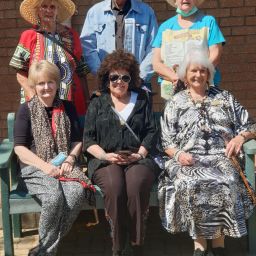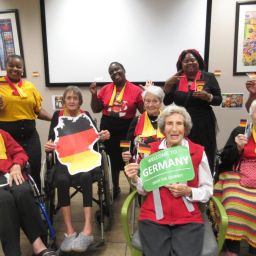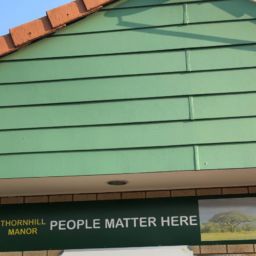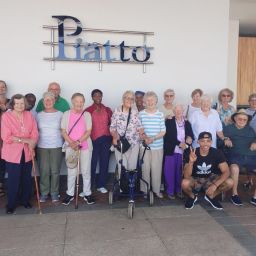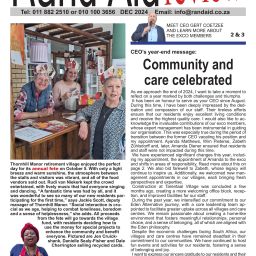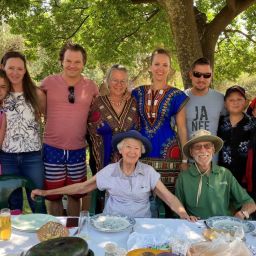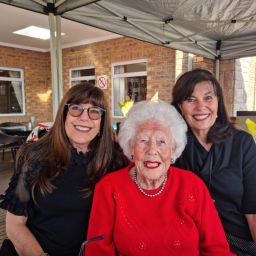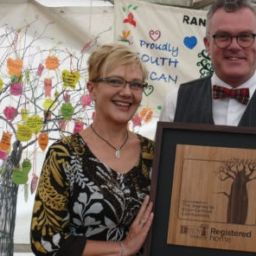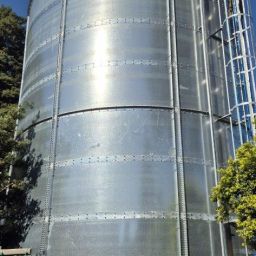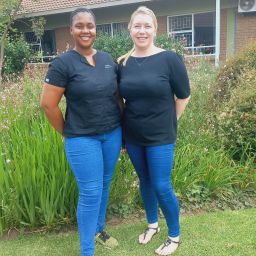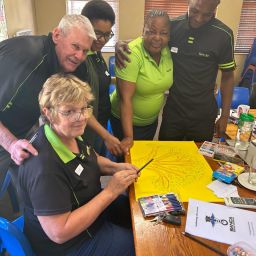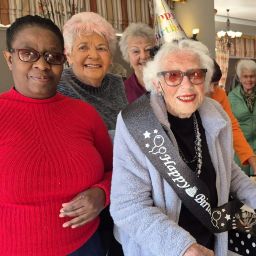Covid-19 has been the overriding theme of the past year. This dreaded virus caused havoc worldwide and there is hardly a country that has been spared. Locally, it has had a devastating effect on the economy and caused great loss of human life and a significant deterioration in quality of life.
Rand Aid had taken early cognisance of international data identifying the aged population as a high-risk group for infection, hospitalisation and a low recovery rate. Ensuring an effective response to the Covid-19 crisis was therefore very high on the agenda. When the first positive case in South Africa was identified, Rand Aid’s protective measures were already well underway. Throughout the year, systems and processes were implemented and adapted to deal with the pandemic as it progressed. These included the timely procurement of sufficient PPE for staff, providing accommodation options to limit core staff’s exposure to the virus, making advance arrangements with external agencies to replace sick Rand Aid staff, implementing strict but humane lockdown measures, ensuring the best possible infection control protocols to prevent the spreading of the disease and establishing our own isolation care facilities with the dedicated assistance of our contracted medical doctors. Furthermore, we maintained communication with our residents and families, providing transparent information on infections in the Rand Aid communities as well as ongoing education, enabling residents and staff to protect themselves from infection. The support and understanding of residents and their families for our prevention measures was much appreciated, considering the effect it had and continues to have on close contact and visitation, especially in our care centres.
I am proud of the way that the Rand Aid staff rose to the many challenges that Covid-19 brought. As an essential services organisation, Rand Aid’s facilities remained open and fully operational during the national lockdowns. The commitment of staff ensured that our high quality of care continued throughout the pandemic. The Executive Committee prioritised the health and safety of residents and staff above financial considerations as is evidenced by the unbudgeted expenses of over R4,1m on Covid-19 prevention and treatment services. They had the full support of the Board in this approach. Despite everything we did, a number of Rand Aid staff members and residents contracted Covid-19. Sadly, we also experienced deaths amongst residents, mainly from our care centres due to the virus or its complications. Vaccination, for staff and residents, is obviously very important in our vulnerable communities. We therefore immediately responded to calls from the Department of Health for sending nursing staff on vaccination training and undertook all the other preparations necessary to be able to establish our own vaccination sites.
I am pleased to report that as a result of the excellent planning undertaken, Rand Aid was part of the vaccine roll out in June 2021 and at the time of writing this report, trained staff had administered 3660 vaccinations to residents and co-workers.
Rand Aid has always had a strong management board where members’ expertise, experience and connections have been of great benefit to the organisation. The oversight and guidance provided by the Board has also been critical in the success of the organisation. It is essential that this tradition continues. Under the leadership of Peter Quinn, our new CEO, a fresh approach to governance was adopted, which included the establishment of Board committees to enhance Board operations. The Membership committee will focus on optimising board capacity through selection and information processes whilst the Finance and Risk committee will provide an additional layer of oversight ensuring that financial resources are used appropriately and optimally to achieve organisational objectives. Other initiatives to strengthen corporate governance included modernising and updating the Rand Aid constitution and developing written governance guidelines in line with the King IV Governance Principles for Non-Profit Organisations. One should never forget that Rand Aid Board members serve and carry great responsibility without any remuneration or reimbursement. Therefore, we are most grateful for the quality of person serving on the Board and their deep interest in ensuring a viable and sustainable organization providing excellent services to all residents. Their time and expertise are highly appreciated by staff and residents alike who depend on this organisation for their quality of life, albeit in different ways.
Rand Aid’s main aim is that of a charitable organisation, focusing on the care of older persons as well as on substance abuse treatment. The RA Welfare Development Trust (RAWDT) was established in 1997 to assist Rand Aid with funding for its welfare operations. The RAWDT focuses on the development and sale of retirement housing on a life right basis. This model has been very successful in providing significant funds for Rand Aid’s welfare services. In the year under review, an amount of R24,1m was donated from the RAWDT to cover shortfalls in Rand Aid, mainly for services at Thembalami Care Centre and Wedge Gardens Treatment Centre as well as for general administrative and operational expenses. The financial support of the RAWDT for services at Thembalami Care Centre (including MODA) and Wedge Gardens Treatment Centre is now almost double the amount of R8 480 568 received in Government subsidies for these services totalling R15 970 611.
Despite the insecurities in the market place caused by Covid-19 as well as political ructions and the deterioration in state and state-owned entities, the Trust’s investment portfolio, which is being managed by Investec Wealth & Investment, did well. At year end the market value was R246.9 million. Life right liabilities were R559.1 million.
Increasing our life right portfolio is an important strategy in our commitment to maintain and grow our social welfare services. The Board, in 2018, approved the purchase of 8,1 hectares of land from the Glendower Golf Club with a view to develop 120 retirement units on this property, extending the life right portfolio to 731 units. Municipal processes to obtain approval for this development remain severely constricted by lock down regulations. This lack of progress has also affected our ability to complete our design, marketing and financial feasibility studies.
Considering the dependence of Rand Aid’s welfare services on financial support external to Government subsidies, it is essential to continuously assess our business model for ongoing viability and growth. This goes hand in hand with a review of our strategic objectives and aligning our operational services accordingly. Peter Quinn and his executive team have made good progress in reviewing the previous strategic plan adopted in 2018. Economic, market and societal conditions are fluid and strategies need to adapt timeously to keep the organisation on a path of success. The Board looks forward to working with them in finalising a new plan that will guide the organisation to even greater heights in the next 3 years.
Rand Aid has a unique approach to service delivery. We aim to ensure that all persons that connect with us experience improved wellbeing, regardless of who they are and which services they utilise. The wellbeing of the residents in our life right units is thus as important to us as that of the residents in our subsidised services. We strongly believe that one cannot provide life right accommodation without caring for the persons who purchase it. The residents in these villages are not only significant partners in our mission to provide accommodation and care services to those who cannot afford the full costs of such services, but they are also a vulnerable age group affected by the financial, health, social, emotional, interactional and psychological aspects of ageing. In line with this philosophy the RAWDT continues to channel funds from life right sales to the levy stabilisation funds of the 3 life right villages to ameliorate levy increases. An amount of R1 848 066 was allocated for this purpose and a further R323 783 to fund extraordinary repairs and maintenance in these villages. Since the inception of the levy stabilisation fund in April 2011 an amount of R10 113 983 has been used to ameliorate levy increases and a further R1 316 640 will be utilised in 2021/22.
The value of the fund at 31 March 2021 was R4 836 480. The Trust, via Rand Aid, also continues to fund a community care service for village residents as wellbeing requires much more than financial security. The close relationship between Rand Aid and the RAWDT thus benefits not only the welfare services component, but also the life right villages.
The cost of Covid-19 responses as well as lockdown restrictions placed a hold on many projects and activities, including planned capital expenses and preventative maintenance. Only the most essential items were attended to. This approach signalled responsible financial management in uncertain times as was confirmed during the auditing process. After years of making use of KPMG for audit purposes, the Board went to tender and appointed PwC for the 2021 audit. I am pleased that the audited financial statements for 2021 was again unqualified and confirmed the going nature of the organisation as well as its strong financial management. The constructive input made by the new audit team to improve our excellent financial accounting practices even more, is appreciated.
I bring tribute to Iain Fraser, who served on the Rand Aid Board for 24 years, the last year as Chairman. Iain resigned in April 2021 and subsequently passed away. He had a deep interest in the services of Rand Aid and many residents and staff knew him personally. He will be sorely missed.
Rand Aid has a long and proud history. The project to document the first 115 years of the organisation’s work was completed during the year. There is much satisfaction in reading how the foundation laid by the early pioneers has been developed over time to what we find today – a well-managed and successful organisation that evolved with the times and which continues to serve the community with great commitment. The book is available on our newly revised and refreshed website.
During the 7 years that I have served on the Board I have come to appreciate the quality of the services being offered and the excellent manner in which the organisation’s day to day operations are undertaken. I look forward to continuing my association with Rand Aid in my new capacity as Chairman. I thank my fellow board members for their support as well as the Rand Aid staff for their loyalty and dedication. Rand Aid makes a difference in the lives of so many people every day, 24 hours a day. It is a most worthy cause, deserving our best efforts in the year ahead.
Paul Carter
Chairman
22 September 2021


